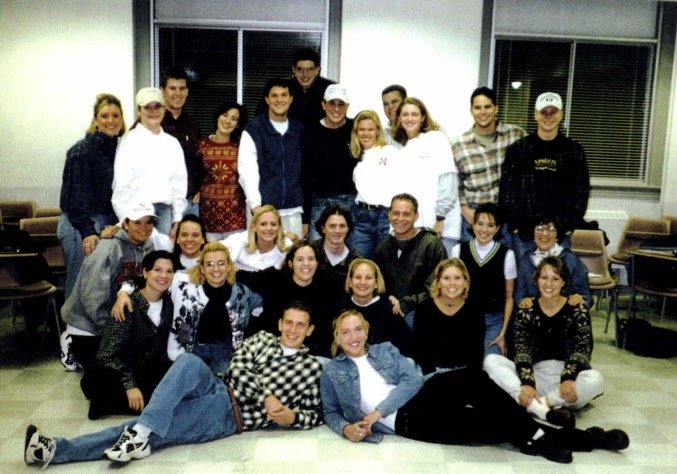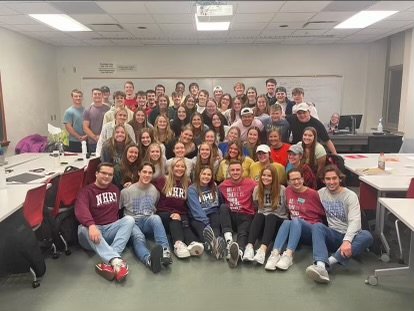Story 59 - The Interview: Mentorship that Starts with Talent
At the heart of NHRI lies a simple yet powerful concept: pairing highly talented college leaders with middle and high school leaders. This one-on-one mentorship model has created ripples of impact, influencing generations of students and mentors alike. From its founding to today, NHRI has understood that effective mentorship begins with selecting the right mentors. The question of what makes a natural fit has been central to the organization's success. Dr. Clifton and Dr. Hall sought to answer this in the program's early years, developing a unique interview process to identify those with an innate talent for leading, developing, and mentoring. Interviewers receive extensive training to maintain continuity in the selection process, ensuring the program consistently attracts exceptional mentors.
Dr. Lindsay Hastings, NHRI Research Director shared: “Our selection is based almost exclusively on the original research of Dr. Hall and Dr. Clifton. When they were first conducting research, they identified students in their classes who demonstrated what they called high human relations capital. Essentially, they were looking at students who were successful at positive relationship building in several different contexts or several different environments. So then what they did with those students was they interviewed them to try to understand the dimension of that talent [and] what themes seem to feed into that human relations capital. They identified 13 common themes of talent among the students who demonstrated high human relations capital, and then they built a selection instrument around those 13 themes. [For each theme], they identified an entire battery of questions that might be an indicator or a measure of that talent theme. And then they tested all of those questions among the students with high human relations capital. Wherever they saw a common agreement in the answers, those items were retained. The selection instrument that we use today for selecting mentors in NHRI is the same selection instrument that we've been using for much of our program’s history. There have been some adjustments made over time just to language, making sure that we're also considering a means of 21st century leaders around diversity, accepting difference, those kinds of things. So the selection instrument has been adjusted over time, but it is largely based on the original research of Dr. Hall and Dr. Clifton.”
“I remember thinking it was quite an honor to be considered because there was a lot of responsibility with it. I looked for people who, yes, had natural leadership abilities, but who wanted to improve and take it seriously. I looked at people who wanted to give, versus those who wanted to receive. It was popular to be part of NHRI. I looked at those who wanted to help others versus resume building and get in with a fun crowd.”
“This may sound hyperbolic, but being the NHRI Interviewer was one of the greatest honors of my young-adult life. It was like someone passed me the most beautiful, intricate and fragile baton; it was my job to ensure NHRI’s future continued by listening to the most talented college student leaders at UNL.
Between interviews, I remember sitting in the student meeting space. (At the time, the student meeting space was in the basement of the Agricultural Communications Building on East Campus.) Portraits of Dr. Hall and Dr. Clifton hung on the wall. I would look into their eyes and remind myself of the rich history surrounding NHRI. It was as if they were looking back at me to remind me that I play a small, but very significant role in furthering the mission of such an incredible organization.”
“It really helped me to see how everyone has different strengths. I think I interviewed maybe over 100 individuals. Yes, there were times of difficulty where you wanted to include everyone … It’s just so much responsibility. Because (you know NHRI) does change a person’s life.”
The recruitment process has evolved over the years. While initially relying on one staff interviewer, often an upper-class student, NHRI now conducts informational sessions on campus and interviews over the winter to attract a diverse group of applicants. Most new mentors are selected by early spring, allowing them to start their mentoring journey, register for leadership classes, and become ingrained in NHRI's mission.
“The identification and selection of investors continues to be a primary element in providing a climate for maximizing human potentiality, To have an interest and genuine concern for other individuals in a requisition, but for real growth to occur in another individual, it is imperative that the counselor have a reservoir of human relations capital to invest.” (Excerpt taken from the 1970-71 NHRI Annual Report)
Some may question whether the interview process should evolve with the times. However, NHRI has found that the natural talents required for mentorship remain the same, regardless of the era. Mentors must demonstrate a deep care for others' development, a natural willingness to give their time and talent, and a genuine connection to NHRI's mission of creating lasting positive change. After selecting naturally gifted leaders, NHRI invests in their knowledge, skills, and experience in leading others.
NHRI's standardized selection instrument, rooted in positive psychology, focuses on identifying natural talents rather than learned skills. NHRI's commitment to selecting and nurturing talented mentors has been key to its enduring success. As the organization celebrates its 75th anniversary, we look forward to many more years of fostering leadership and mentorship. The power of human connection and the transformative impact of investing in the potential of others starts with attracting and developing high-potential mentors. NHRI is proud to continue this legacy of selecting talent for generations to come.
“That gave me a whole different spin on even interviewing for a job. It’s not a game you’re trying to win. It’s really a match you’re trying to make and there’s no winning or losing. It’s just, if we can understand the fullest expression of an actual human, we can find a place where that actual human can thrive. And it’s a two way street of matchmaking. It’s not winning or losing.”
“The reason why NHRI is here, 75 years after its inception, is because of the exceptional students who have been involved in this program. And certainly, I credit the research of Dr. Hall and Dr. Clifton that led to the selection instrument because that has been an invaluable tool in bringing such wonderful students to our program.”







